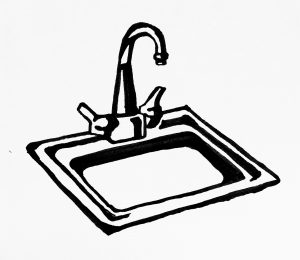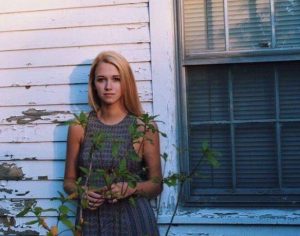
Chowder Bath
Listen to the author read “Chowder Bath” at the launch party of The Blackstick Review in May 2017. Story begins at 1:05-
The house they used to live in had a large kitchen sink, a garden out back, and a shower drain perpetually clogged with dark blonde hair. The mother they used to live in was always turning her brave face to the baby books while her two daughters grew upwards in a direction she couldn’t stop. She would jab her finger into the photos of their infant bodies being washed in the bubbly, pink sink between the fridge and the dishwasher. Back when they were so small she could hold every piece of them in her hands.
The same year her elder daughter—Mary—was born, she planted a fig tree in the backyard.
Now, in the still summer heat, her girls would snatch fat fruit from the branches and carry it in wicker baskets back to the railed porch. The sun was so assertive you could hear the AC rattle all the way from the back yard. The yelling vents and clanging pipes convinced the children that their house was trying to fly to the moon. The girls paraded their baskets into the kitchen; their sandaled feet slapped against the cool floor as thick air hung over their shoulders.
Weeks passed and baskets of the fruit sat on every surface of the house. Bowls lined the kitchen table, and the stacked fig towers threatened to topple over. Every afternoon they’d nestle the new harvest amongst the old. With time, the bottom-level figs flattened and melted against the base of the baskets. Buried, month-old fruit slept right there with the fresh.
When the sweet smell turned to decay, the girls would wrap their claws around the wicker handles and skip their harvest back to the yard. They’d toss and splatter the soft figs against the trees. Sticky hands squeezed the fruit between palms until the sides split and seeds spilled onto the ground. Kath would grind them into the concrete with her light-up tennis shoes. LED lights beaming as she stomped purple goo into the driveway. The girls were left out to rot like fruit, happily in the sun.
At the bus stop on the last day of August—Kath—the smaller girl, folded herself in half and covered her sandals with a half-digested fig breakfast. She slid her feet out of the shoes and rubbed her toes into the still-dewy, morning grass. She dropped her sandals beside the hose, and dragged herself back up the saggy, front porch steps. Her fingernails dug deep into the railing; she knew the rotten wood would give under the pressure of her grip. Specks of white paint stuck to her palms. She rubbed her hands into the thin fabric of her dress and eyed the hanging plants that failed to brighten the porch.
Something was wrong, and the doctor who told them had platinum blonde hair and a windy smile that came and went with her words. Both parents were sitting on a shiny, splash-proof couch—the kind made specifically for hospital lobbies. Everyone folded their hands into their laps, and Barbie doctor spit out the diagnosis like a worn piece of gum.
On her third day home from the hospital, the mother shoved a bright blue sand pail into Kath’s hands. Kath would clutch the empty bucket, fill it with toys, and swing it up and down the hallways. Every couple hours they’d hear the hollow, plastic dolls dump and clatter into the hardwood floor while the little girl heaved over her pail and surrendered her breakfast.
She quaked when she threw up, not like a leaf, but like a ratty public school built in the 60s trying to stand up in the middle of a hurricane. For the first couple of weeks she would wipe off her chin with the back of her sleeve and keep running. The mother would trade her for a clean bucket and wash the soiled ones out in the kitchen sink. Small stacks of neon sand pails adorned the countertops, and the older daughter started rinsing her fruit under the bathroom faucet.
Days later, Kath started coughing from the bathroom. Mary pushed through the door and found her propped up in a bath that she wasn’t supposed to take. She had filled the water too hot and high, and lunch was dripping off her face, down the front of her chest. She slumped down into a steaming pool of pink bubbles floating alongside chunks of her meal. Recognizable pieces of corn skimmed along the surface of the bath. She peeped her mouth above the waterline.
“Do you like the soup I made?”
The girls cackled until the walls rattled with them, and the younger one was tugged out of the chowder bath by her armpits.
They yelled for the mother to come see, and didn’t eat soup for a year.
*
With no hands to pick them, the figs grew until their sides split. The dangling masses tugged the branches towards the dirt and made the whole tree slump weepily away from the sun. Beetles and flies found a supper and a home and began to burrow into the overripe fruit. Fall came and went; the figs withered, dropped, and turned into soil. Pocket-size leaves fell, and the tree was light enough to sway recklessly with the breeze like a drunk at the bar.
Inside, the kitchen wicker baskets sat empty but remembered the summer, still sticky to the touch.
*
The mother didn’t believe in God, but she believed in church, big hats, and Sunday School. Eventually her worship paid off in the form of bottomless, gifted casserole. Each week a choir member would stop by with meals that the mother learned to stop politely rejecting.
Mr. Sullivan passed through once a month. He was 6’ 4” and a smoker. He had a bottle opener permanently strung onto his keys; they danced in his hand as he knocked on their front door. Kath opened the screen to let him through. He tried not to seem bothered by her condition, even though it looked as if someone had stuck a straw in her and sucked out most of what was inside.
Kath slumped back into the living room when the mother entered, and the adults began their conversation. A few minutes in, Mr. Sullivan put his sunglasses on. His face warped into a feigned pleasantry, his eyes like a levy in a storm. A fat tear rolled out from under his glasses and slapped against the tile floor. It was almost polite.
The Sullivan family practiced relentless hospitality and hosted dinner parties any time they could find willing company. Ms. Sullivan was thirty-four years old, had 2.5 kids, and worked closely with the PTA. Her hair was chestnut brown, her skin was freckled porcelain, and teeth were so white they invited you to yank them out one by one. Over the families’ last dinner party Ms. Sullivan told the mother about how she cured her depression by eating leafy greens and recommended the acacia berry as an alternative form of chemotherapy. The mother grinned, nodded, and tossed a full glass of wine down her throat. Ms. Sullivan said it was a shame that Kath was so young; if she was older she’d be a shoe-in for homecoming queen.
“I mean can you imagine? 12 News covering a beautiful, bald prom queen!”
It was the South, so they just laughed, and Mary passed her the spinach.
*
That summer the family grabbed sand pails off the kitchen counter, stole fruit from the backyard, and drove East to the Outer Banks. Mary bathed in zinc and lay out to bake on the sand. From under the umbrella shade, the mother offered everyone figs. Each one was eventually tucked back into the cooler. Kath took her blue pail and made whole castles with it in the coarse sand beside the shore.
 Carrie Clowers is a junior at Mount Holyoke College; she has an English major and a minor in Journalism, Media, and Public Discourse. Carrie works as a graphic designer for the Mount Holyoke News and serves as publicist for “Moneta” Literary Magazine. In her free time, she loves to dance and draw portraits. In the future, she hopes to pursue a career in news and media.
Carrie Clowers is a junior at Mount Holyoke College; she has an English major and a minor in Journalism, Media, and Public Discourse. Carrie works as a graphic designer for the Mount Holyoke News and serves as publicist for “Moneta” Literary Magazine. In her free time, she loves to dance and draw portraits. In the future, she hopes to pursue a career in news and media.